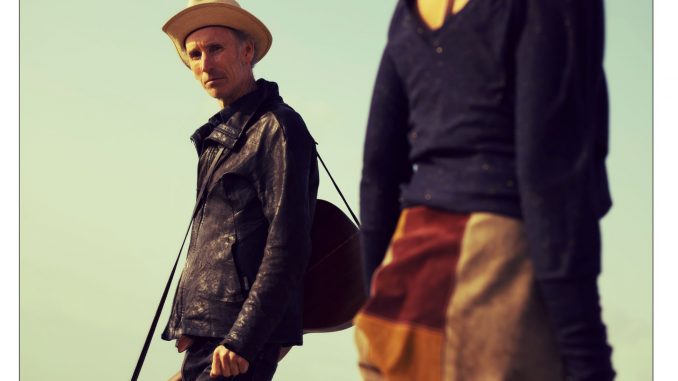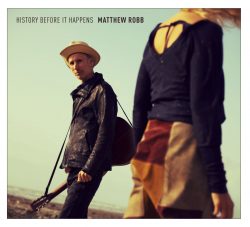
An accomplished yet ambiguous offering from the world-weary poet.
 UK-born, Germany-based poet and songwriter Matthew Robb’s fourth album, ‘History Before It Happens’ has a slippery, ambiguous character. Through syllable-packed songs lamenting the state of the world, politicians, war and environmental plunder, among other targets, the album is at turns a call to action, a lyrical pummelling of hopelessness, and a jumble of paranoid suspicion. There is no denying Robb’s poetic talent; though at times the cataloguing of modern ills becomes a little belaboured and hyperbolic (though often arguably correct), at others there is a glowingly incisive turn of phrase, summing up contemporary alienation and dread. Further, despite the predominant sense of despair in which the album is drenched, there are also shoots of hope and sweetness among the swathe of destruction and pillage. Across the album, the instrumentals are a standout; Robb is backed by an exceptional band, whose members use relatively simple arrangements with expert skill to paint vistas of desolation and emptiness, summon bluesy chaos, or invoke a timeless, pastoral folk sound.
UK-born, Germany-based poet and songwriter Matthew Robb’s fourth album, ‘History Before It Happens’ has a slippery, ambiguous character. Through syllable-packed songs lamenting the state of the world, politicians, war and environmental plunder, among other targets, the album is at turns a call to action, a lyrical pummelling of hopelessness, and a jumble of paranoid suspicion. There is no denying Robb’s poetic talent; though at times the cataloguing of modern ills becomes a little belaboured and hyperbolic (though often arguably correct), at others there is a glowingly incisive turn of phrase, summing up contemporary alienation and dread. Further, despite the predominant sense of despair in which the album is drenched, there are also shoots of hope and sweetness among the swathe of destruction and pillage. Across the album, the instrumentals are a standout; Robb is backed by an exceptional band, whose members use relatively simple arrangements with expert skill to paint vistas of desolation and emptiness, summon bluesy chaos, or invoke a timeless, pastoral folk sound.
The album opens with tone-setter ‘The Greatest Danger to Man is Man’ – melancholy chords sit beneath echoing electric guitar flourishes, like bedraggled decorations at a post-apocalyptic festival-site. Through this desolate atmosphere, Robb makes his dour pronouncements: “In this age of cowardice and convenience… A nation of sheep begets a government of wolves” yet also provides a beam of hope “break lose the chains, root the evil out… embrace love, relinquish war”. The chorus is pretty and warm, warning humankind of their destructive tendencies and providing a call to action, tugging that strand of hope running through most of the album. The seeds of an inherent contradiction are sown in this track – Robb’s apparent libertarian/anarchist, somewhat-individualistic perspective, combined with a desire for some form of vague, positive collective action against the prevailing tide of corrupt government, war and environmental destruction; there are calls to “brothers” and “sisters”, but also biting criticisms of “sheep”, “gullible masses” and “slaves” revelling in mediocrity – it can feel jarring at times.
‘Sacred Heart’ sets out the album’s secondary personality – a hopeful, almost sweet side. The song acts as an exhortation to listen and be true to one’s authentic convictions: “Sacred heart pure and true, reveal to me the scene you view/ fix your gaze, don’t look away or be blinded by the light of day”. The track also has a religious and atavistic edge: “Sacred heart with your tree like roots, turn around these worn out boots” – the metaphors here suggest an internal, mystical guide, something essential, solid and steadfast. Musically, the song is exemplary folk, with traditional chord patterns emerging like a well-known path; there are, however, well-placed seventh chords and a bed of organ giving the track a subtly devilish edge.
On ‘The Devil Drives’ Robb lists what he perceives as today’s most egregious maladies in neat rhyming couplets: “governmental overreach, the demolition of free speech… create addiction by design, the slow sadistic rape of mind… marauding psychopaths in suits, like naked emperors on the loose… reductionist draconian bills, see shepherds turning into wolves…social ruin, dystopian tricks, medicines that make you sick… blind obedience, conceited hacks, crippling lies, distorted facts”. The lyricism walks a thin line between impressive poetry which bemoans justified grievances, and parody of some isolated pseudo-philosopher’s paranoid sermons – sometimes the latter detracts from the album’s effect.
‘Tower of Babel’ is the best song on the album. Robb paints the image of a dystopia which recalls Leonard Cohens ‘The Future’: “The corridors of power are dimly lit and the roads filled with famine and war/ The devil has been cast inside a bottomless pit and now tears up through the earth like a scar”. The instrumental is excellent – Tobias Hoffmann’s spidery electric guitar, dripping in reverb, sits atop Frank Schönhofer’s stuttering, unearthly bass – the sound is dark, desolate and damp like a cave. As suggested by the title, the track’s lyrics set out a critique of humankind’s self-destructive hubris as embodied by capitalism, war and the plunder of nature. The lyricism is sharp, making for a more engaging listen than on tracks such as ‘The Devil Drives’ and ‘Throne of Blood’. The track ends with a haunting instrumental, with guitar harmonics ascending to the top of the titular tower.
‘The Wanderer and his Shadow’ is also Cohenesque – a pretty folk tune with dreamlike acoustic fingerpicking. The opening line: “The light rose at the heart of the world, I saw a rainbow in the eyes of my girl/ It was what it was for what it’s worth, and the rivers run like the veins of the earth” conjures an image of a time before the Fall, and the refrain: “Astrid, the Mexicans and me/ on our great journey east” hints at humankind’s eastward travel at the opening of the biblical Tower of Babel narrative. The track features a nice guitar solo, festooned with whooshing cymbals and chattering, New Wave-style bass.
‘Throne of Blood’ is a messy, clownish blues, its chaotic nature rendering socio-political demise in sound. It is hard not to interpret the lyrics here as a thinly-veiled critique of a recent global health event – again, it can be hard to disagree with some of Robb’s views, but here there are moments where some of the sentiments are a little edgy – each to their own. The track closes out with a classic blues-rock jam.
‘Little Black Train’ is a light-hearted country-blues trot, where death is cast as the titular carriage. The lyrics feature a clever and humorous series of expressions for death and as the song ends the electric guitar mimics the whistle of a steam train approaching. ‘War is the father of all things’ is a forgettable soft-rock track which treads the same ground as several previous songs, offering little novel insight. The closer, ‘Let It Go’, is a simple acoustic guitar and vocal affair, ruminating on societal structures, trajectories and mortality. There is a compassion and tenderness in parts of these songs, which at times is smothered by diatribe.
‘History Before it Happens’ is a dense, complex, highly accomplished album which both enlightens and depresses. The lyrics are voluminous and brimming with literary, folkloric and Biblical references and evidence Robb’s experience as a poet and knowledge of the genre; the music is highly impressive too. Nonetheless, a couple of the tracks overstay their welcome and the second half of the album is weaker than the first and feels a little repetitive. Although it is hard to disagree with many of Robb’s jaded and doom-laden descriptions and prophecies, sometimes the ambiguity in the the target of Robb’s ire can make listening an uncomfortable experience. Still, this is an impressive album, packed with trenchant and thought-provoking poetry set to good music played by an excellent band.


